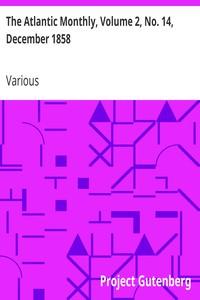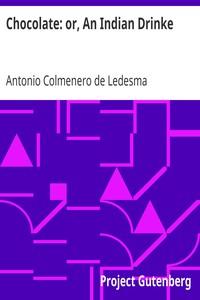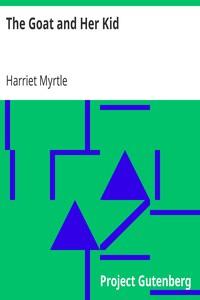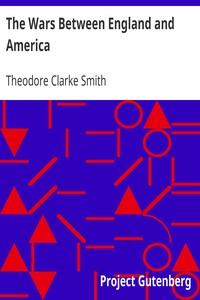|
|
Read this ebook for free! No credit card needed, absolutely nothing to pay.Words: 89478 in 24 pages
This is an ebook sharing website. You can read the uploaded ebooks for free here. No credit cards needed, nothing to pay. If you want to own a digital copy of the ebook, or want to read offline with your favorite ebook-reader, then you can choose to buy and download the ebook.

: The Atlantic Monthly Volume 2 No. 14 December 1858 A Magazine of Literature Art and Politics by Various - American periodicals The Atlantic Monthly@FreeBooksTue 06 Jun, 2023 ATLANTIC MONTHLY. A MAGAZINE OF LITERATURE, ART, AND POLITICS. THE IDEAL TENDENCY. We are all interested in Art; yet few of us have taken pains to justify the delight we feel in it. No philosophy can win us away from Shakspeare, Plato, Angelo, Beethoven, Goethe, Phidias,--from the masters of sculpture, painting, music, and metaphor. Their truth is larger than any other,--too large to be stated directly and lodged in systems, theories, definitions, or formulas. They suggest and assure to us what cannot be spoken. They communicate life, because they do not endeavor to measure life. Philosophy will present the definite; Art refers always to the vast,--to that which cannot be comprehended, but only enjoyed and adored. Art is the largest expression. It is not, like Science, a basket in which meat and drink may be carried, but a hand which points toward the sky. Our eyes follow its direction, and our souls follow our eyes. Man needs only to be shown an open space. He will rise into it with instant expansion. We are made partakers of that illimitable energy. Only poetry can give account of poetry, only Art can justify Art; and we cannot hope to speak finally of this elastic Truth, to draw a circle around that which is vital, because it has in it something of infinity,--but we may hope to remove a doubt growing out of the very largeness which exalts and refreshes us. Art is not practical. It offers no precept, but lies abroad like Nature, not to be grasped and exhausted. Neither is it anxious about its own reception, as though any man could long escape the benefit which it brings. Every principle of science, every deduction of philosophy, is a tool. Our very religion, as we dare to name it, is a key which opens the heavens to admit myself and family. Art offers only life; but perhaps that will appear worth taking without looking beyond. Can we look beyond? Life is an end in itself, and so better than any tool. The pioneer of our growth is Imagination. Desire and Hope go on before into the wilderness of the unknown; they open paths; they make a clearing; they build and settle firmly before we ourselves in will and power arrive at this opening, but they never await our coming. They are the "Fore-runners," off again deeper into the vast possibility of being. The boy walks in a dream of to-morrow. Two bushels of hickory-nuts in his bag are no nuts to him, but silver shillings; yet neither are the shillings shillings, but shining skates, into which they will presently be transmuted. Already he is on the great pond by the roaring fire, or ringing away into distant starry darkness with a sparkling brand. Already, before his first skates are bought, before he has seen the coin that buys them, he is dashing and wheeling with his fellows, a leader of the flying train. That early fore-reaching is a picture of our entire activity. "Care is taken," said Goethe, "that the trees do not grow into the sky"; but man is that tree which must outgrow the sky and lift its top into finer air and sunshine. The essential seed is Growth; not shell and bark, nor kernel, but a germ which pierces the soil and lifts the stone. Spirit is such a germ, and perpetual reinforcement is its quality; so that the great Being is known to us as a becoming Creator, adding himself to himself, and life to life, in perpetual emanation. Out of such material as we can gather we make a world in which we walk continually up and down. In it we find friends and enemies, we love and are loved, we travel and build. In it we are kings; we ordain and arrange everything, and never come away worsted from any encounter. For this sphere arises in answer to the practical question, What can I be and do? It is an embodiment of the force that is in me. Every dreamer, therefore, goes on to see himself among men and things which he can understand and master, with which he can deal securely. The stable-boy has hid an old volume among the straw, and he walks with Portia and Desdemona while he grooms the horses. Already in his smock-frock he is a companion for princes and queens. But the rich man's son, well born, as we say, in the great house yonder, has one only ambition in life,--to turn stable-boy, to own a fast team and a trotting-wagon, to vie with gamesters upon the road. That is an activity to which he is equal, in which his value will appear. Both boys, and all boys, are looking upward, only from widely different levels and to different heights. Into the lowest courses there enters something to keep the filth from overwhelming self-respect. The advocates of slavery have not, as it appears, lost all pretence of honor and honesty. Thieves are sustained by a sense of the injustice of society. They do but right an old wrong, taking bravely what was accumulated by cautious cunning. They cultivate many virtues, and, like the best of us, make much of these, identify themselves with these. If a man is harsh and tyrannical, he regrets that he has too much force of character. And it is not safe to accuse a harlot of stealing and lying. She has her ideal also, and strives to keep the ulcer of sin within bounds,--to save a sweet side from corruption. Is this stooping very low to look for the Ideal Tendency? The greater gain, if we find it prevailing in these depths. We may doubt whether thieves and harlots are subject to the same law which irresistibly lifts us, for we know that our own sin is not quite like other sin. But I must not offer all the cheerful hope I feel for the worst offenders, because too much faith passes for levity or impiety; and men thank God only for deliverance from great dangers, not for preservation from all danger. For gratitude we must not escape too easily and clean, but with some smell of fire upon us. Yet in our own experience this planning what we shall do and become is constant, and always we escape from the present into larger air. The boy will not be content with that skill in skating which occupies his mind to-day. That belongs to the day and place, but next year he goes to the academy and fresh exploits engage him. He works gallantly in this new field and harness, because his thought has gone forward again, and he sees through these studies the man of thought. Already as a student he is a philosopher, a poet, a servant of the Muse. Bacon and Milton look kindly on him in invitation, he is walking to their company and in their company. The young hero-worshipper cannot remain satisfied with mere physical or warlike prowess. He soon sees the superiority of mental and moral mastery, of creation of good counsel. He will reverence the valiant reformer who brings justice in his train, the saint in whom goodness is enamored of goodness, the gentleman whose heart-beat is courtesy, the prophet in whom a religion is born, all who have been inspired with liberal, not dragged by sordid aims. How beautiful to him is the society of poets! He reads with idolatry the letters and anecdotes of Coleridge and Wordsworth, Goethe and Schiller, Beethoven and Raphael. Look at the private thought of these men in familiar intercourse: no plotting for lucre, but a conspiracy to reach the best in life. The saints are even more ardent in aspiration, for their tender hearts were pressed and saddened by fear. They are now set on fire by a sense of great redemption. They are prisoners pardoned. For scholars the world is peopled only with saints, philosophers, and poets, and the studious boy seeks his own amid their large activity. So much of it meets his want, yet the whole does not meet all his want. He must combine and balance and embrace conflicting qualities. Every day his view enlarges. What was noble last year will now by no means content his conscience. Duty and beauty have risen. Free books android app tbrJar TBR JAR Read Free books online gutenberg More posts by @FreeBooks
: The Bibliotaph and Other People by Vincent Leon H Leon Henry - Stevenson Robert Louis 1850-1894; Book collectors; Hardy Thomas 1840-1928; Keats John 1795-1821; Lyly John 1554?-1606; Priestley Joseph 1733-1804; Gautier Théophile 1811-1872 Bibliomania@FreeBooksTue 06 Jun, 2023

: Chocolate: or An Indian Drinke By the wise and Moderate use whereof Health is preserved Sicknesse Diverted and Cured especially the Plague of the Guts; vulgarly called The New Disease by Colmenero De Ledesma Antonio Wadsworth James Translator - Chocolate@FreeBooksTue 06 Jun, 2023
|
Terms of Use Stock Market News! © gutenberg.org.in2025 All Rights reserved.






